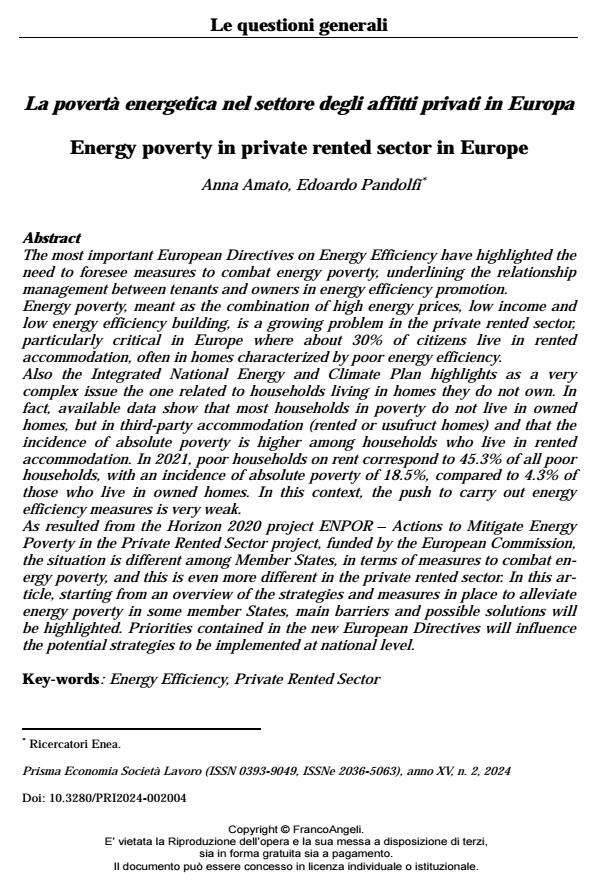Energy poverty in private rented sector in Europe
Journal title PRISMA Economia - Società - Lavoro
Author/s Anna Amato, Edoardo Pandolfi
Publishing Year 2025 Issue 2024/2
Language Italian Pages 10 P. 35-44 File size 108 KB
DOI 10.3280/PRI2024-002004
DOI is like a bar code for intellectual property: to have more infomation
click here
Below, you can see the article first page
If you want to buy this article in PDF format, you can do it, following the instructions to buy download credits

FrancoAngeli is member of Publishers International Linking Association, Inc (PILA), a not-for-profit association which run the CrossRef service enabling links to and from online scholarly content.
The most important European Directives on Energy Efficiency have highlighted the need to foresee measures to combat energy poverty, underlining the relationship management between tenants and owners in energy efficiency promotion. Energy poverty, meant as the combination of high energy prices, low income and low energy efficiency building, is a growing problem in the private rented sector, particularly critical in Europe where about 30% of citizens live in rented accommodation, often in homes characterized by poor energy efficiency. Also the Integrated National Energy and Climate Plan highlights as a very complex issue the one related to households living in homes they do not own. In fact, available data show that most households in poverty do not live in owned homes, but in third-party accommodation (rented or usufruct homes) and that the incidence of absolute poverty is higher among households who live in rented accommodation. In 2021, poor households on rent correspond to 45.3% of all poor households, with an incidence of absolute poverty of 18.5%, compared to 4.3% of those who live in owned homes. In this context, the push to carry out energy efficiency measures is very weak. As resulted from the Horizon 2020 project ENPOR ‒ Actions to Mitigate Energy Poverty in the Private Rented Sector project, funded by the European Commission, the situation is different among Member States, in terms of measures to combat energy poverty, and this is even more different in the private rented sector. In this article, starting from an overview of the strategies and measures in place to alleviate energy poverty in some member States, main barriers and possible solutions will be highlighted. Priorities contained in the new European Directives will influence the potential strategies to be implemented at national level.
Keywords: Energy Efficiency, Private Rented Sector
Anna Amato, Edoardo Pandolfi, La povertà energetica nel settore degli affitti privati in Europa in "PRISMA Economia - Società - Lavoro" 2/2024, pp 35-44, DOI: 10.3280/PRI2024-002004